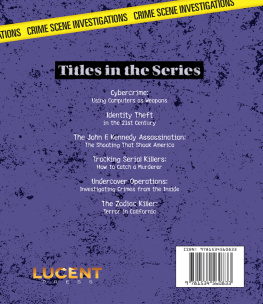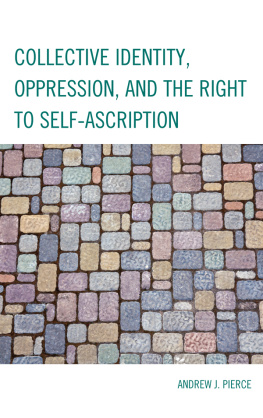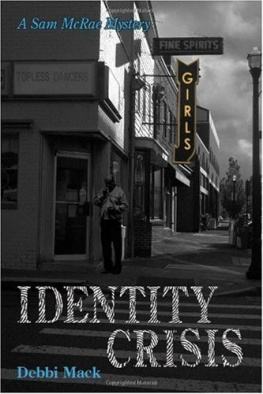R yan is still aware enough that his fathers words come in through the edges, like sunlight on the borders of a window shade. His eyes are shut tight and his body is shaking and he is trying to hold up his left arm, to keep it elevated. We are on our way to the hospital, his father says, and Ryans teeth are chattering, he clenches and unclenches them, and a series of wavering colored lightsgreens, indigosplays along the surface of his closed eyelids.
On the seat beside him, in between him and his father, Ryans severed hand is resting on a bed of ice in an eight-quart Styrofoam cooler.
The hand weighs less than a pound. The nails are trimmed and there are calluses on the tips of the fingers from guitar playing. The skin is now bluish in color.
This is about three A.M. on a Thursday morning in May in rural Michigan. Ryan doesnt have any idea how far away the hospital might be but he repeats with his father we are on the way to the hospital we are on the way to the hospital and he wants to believe so badly that its true, that its not just one of those things that you tell people to keep them calm. But hes not sure. Gazing out all he can see is the night trees leaning over the road, the car pursuing its pool of headlight, and darkness, no towns, no buildings ahead, darkness, road, moon.
2
A few days after Lucy graduated from high school, she and George Orson left town in the middle of the night. They were not fugitivesnot exactlybut it was true that no one knew that they were leaving, and it was also true that no one would know where they had gone.
They had agreed that a degree of discretion, a degree of secrecy, was necessary. Just until they got things figured out. George Orson was not only her boyfriend, but also her former high school history teacher, which had complicated things back in Pompey, Ohio.
This wasnt actually as bad as it might sound. Lucy was eighteen, almost nineteena legal adultand her parents were dead, and she had no real friends to speak of. She had been living in their parents house with her older sister, Patricia, but the two of them had never been close. Also, she had various aunts and uncles and cousins she hardly talked to. As for George Orson, he had no connections at all that she knew of.
And so: why not? They would make a clean break. A new life.

Still, she might have preferred to run away together to somewhere different.
They arrived in Nebraska after a few days of driving, and she was sleeping, so she didnt notice when they got off the interstate. When she opened her eyes, they were driving along a length of empty highway, and George Orsons hand was resting demurely on her thigh: a sweet habit he had, resting his palm on her leg. She could see herself in the side mirror, her hair rippling, her sunglasses reflecting the motionless stretches of lichen-green prairie grass. She sat up.
Where are we? she said, and George Orson looked over at her. His eyes distant and melancholy. It made her think of being a child, a child in that old small-town family car, her fathers thick, calloused plumbers hands gripping the wheel and her mother in the passenger seat with a cigarette even though she was a nurse, the window open a crack for the smoke to trail out of, and her sister asleep in the backseat mouth-breathing behind their father, and Lucy also in the backseat, opening her eyes a crack, the shadows of trees running across her face, and thinking: Where are we?
She sat up straighter, shaking this memory away.
Almost there, George Orson murmured, as if he were remembering a sad thing.
And when she opened her eyes again, there was the motel. They had parked in front of it: a tower rising up in silhouette over them.
It had taken Lucy a moment to realize that the place was supposed to be a lighthouse. Or ratherthe front of the place, the faade, was in the shape of a lighthouse. It was a large tube-shaped structure made of cement blocks, perhaps sixty feet high, wide at the base and narrowing as it went upward, and painted in red and white barber-pole stripes.
THE LIGHTHOUSE MOTEL , said a large unlit neon signfancy nautical lettering, as if made of knotted ropesand Lucy sat there in the car, in George Orsons Maserati, gaping.
To the right of this lighthouse structure was an L-shaped courtyard of perhaps fifteen motel units; and to the left of it, at the very crest of the hill, was the old house, the house where George Orsons parents once lived. Not exactly a mansion but formidable out here on the open prairie, a big old Victorian two-story home with all the trappings of a haunted house: a turret and wraparound porch, dormers and corbeled chimneys, a gable roof and scalloped shingles. No other houses in sight, barely any other sign of civilization, barely anything but the enormous Nebraska sky bending over them.
For a moment Lucy had the notion that this was a joke, a corny roadside attraction or amusement park. They had pulled up in the summer twilight, and there was the forlorn lighthouse tower of the motel with the old house silhouetted behind it, ridiculously creepy. Lucy thought that there may as well have been a full moon and a hoot owl in a bare tree, and George Orson let out a breath.
So here we are, George Orson said. He must have known how it would look to her.
This is it? Lucy said, and she couldnt keep the incredulousness out of her voice. Wait, she said. George? This is where were going to live?
For the time being, George Orson said. He glanced at her ruefully, as if she disappointed him a little. Only for the time being, honey, he said, and she noticed that there were some tumbleweeds stuck in the dead hedges on one side of the motel courtyard. Tumbleweeds! She had never seen such a thing before, except in movies about ghost towns of the Old West, and it was hard not to be a little freaked out.
How long has it been closed? she said. I hope its not full of mice or
No, no, George Orson said. Theres a cleaning woman coming out fairly regularly, so Im sure its not too bad. Its not abandoned or anything.
She could feel his eyes following her as she got out and walked around the front of the car and up toward the red door of the Lighthouse. Above the door it said: OFFICE. And there was another unlit tube of neon, which said:
NO VACANCY .
It had once been a fairly popular motel. Thats what George Orson had told her as they were driving through Indiana or Iowa or one of those states. It wasnt exactly a resort, hed said, but a pretty fancy placeBack when there was a lake, hed said, and she hadnt quite understood what he meant.











